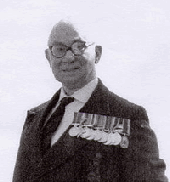



The Parish Church of St George the Martyr, Waterlooville

Autumn Edition 2014
Diaries of a First World War Bugler
March 24th, 1915
We made our first appearance in the trenches at Ypres after spending 2 days in the Cavalry Barracks. We lost a few men going to a spot behind the firing line, the bullets whizzing all over our ranks. The position we occupied was in a small wood, rather a high spot, we shall always remember these two days because we were next to the K.O.S.B. and they treated us remarkably well.
We were relieved by the Lincolns, 9th Brigade, on a very cold night and we marched back to a large camp of wooden huts where we were fairly comfortable, but the only thing was we were being badly treated as regards grub, we having to buy our own food. Previous to this we had 2d a day stopped for kit allowance. We shifted from huts back to Ypres again, this time visiting the Infantry Barracks; at least we went straight up to the trenches and returned to the Barracks on Good Friday night. Here we got a pint of English Beer @ 7d. On Easter Monday we started off for the trenches. It had been raining all the day but we looked forward to a nice night, but no signs of it. Well, this being Easter Monday, one at this game could not realize it; however, we started for the fray at 8 o'clock. Now the journey up to this particular trench was not very easy. We left the barracks behind and were soon on the beautiful country road. We completed about half a mile of this and turned off sharp to the left and commenced to run the gauntlet along a broken up railway track which had been shelled by the Germans and doing this journey in the dark and rain with broken ground and projecting sleepers on a single track was, as I said before, not an easy task. This took about an hour to complete 2 miles. Now to get to our respective trench was another objective with more manoeuvring. We had to climb an incline of muddy fascines, and this done with slipping and sliding and an occasional mud bath, we eventually came to a communication trench which is a good bit of work done by our engineers and has saved thousands of lives and as one journeys on it completely covers you. As you arrive at the other end you are confronted by a small cemetery which I saw in the morning. Now we soon reached the fire trench and, sorry to say, we have to stay here for five days, however, we tramped along to the best of our ability in the slosh and mud. I noticed our boys were well at it, firing at the Huns for all they were worth and at the same time anxiously awaiting relief. We soon took over and the poor old warriors started their tramp home and now we were to start for our five weary days. The rain had actually ceased. Now all one could see in the dark was one mass of sandbags, composing a gloriously constructed trench. Morning arrives at last. This trench was 70 yards away from the Germans at my portion and 40 yards a little way along which was called the “Cemetery Trench”, and a good name too! Under my parapet was the remains of a Frenchy and the stink, oh my! Now at my back was another one just lying in the parapet with his pack on and barely covered in earth, another here, one there, in fact everywhere, and all one could see along this stinking chloride of lime trench, was blood running from the sides. About 50 yards along the trench and outside was another Frenchy who was as dead as a doormat, lying prone on the ground frantically clutching the earth, evidently in the last strains of his life, absolutely exposed and unburied, he looked as if he had met his doom cutting the barbed wire entanglements. He had his sleeping cap on and looked a pitiful sight, and as the trench we occupied was originally a German one, this fact struck me. All this I noticed as daybreak came. Furthermore in front of our trench, between the German lines and our own, were crowds of dead all lying about, impossible to get at. The following day was another demon, more soup favoured us. Now quite near to the trench was a very pretty little spot where one could obtain water and I think it's worth describing.
From our trench we looked down onto a railway cutting -
We got to the huts again, our rest camp a distance of about 5 miles. On the Monday we were all out in the fields drilling etc. Now to describe the Zeppelin’s raid on our camp. I turned in about 9 o’clock. The air being rather warm I decided to sleep with another friend “Nobby Stanley”, in the open. Well, the night was very black and, being tired, we were soon asleep. We were rudely awakened by what we thought to be very large shrapnel bursting over us, but which afterwards turned out to be bombs; The Zep was just dimly to be seen and our machine guns soon got into action but owing to the great height of the Zep she got away untouched. I went into the next field in the morning to inspect the holes made by the bombs. Some were 23 yards in circumference with a depth of 6 feet. The next day we went up trench digging and I noticed the French Barracks of Ypres had been shelled.
April 15th 1915
I think summer has arrived as we are having grand weather. Today we saw our old friends “The Rangers” otherwise 12th County -
April 16th 1915
In the evening we saw a rather excited battalion of Q.V.R.s waiting to see Hill 60 blown up. Punctually at 6 o’clock the mines were fired and up went the hill followed by a heavy bombardment which lasted all night long. It was a grand sight to watch shrapnel bursting everywhere, our guns flashed out from all over the show.
Two regiments from our brigade, the 13th, namely the K.O.S.B. and the West Kents, were up there to charge the trenches. They succeeded in every way but at great loss. I saw them coming back -
To be continued

To mark the 100th anniversary of the outbreak of World War I, we are continuing the serialisation of the diaries of Bugler John McCormack -